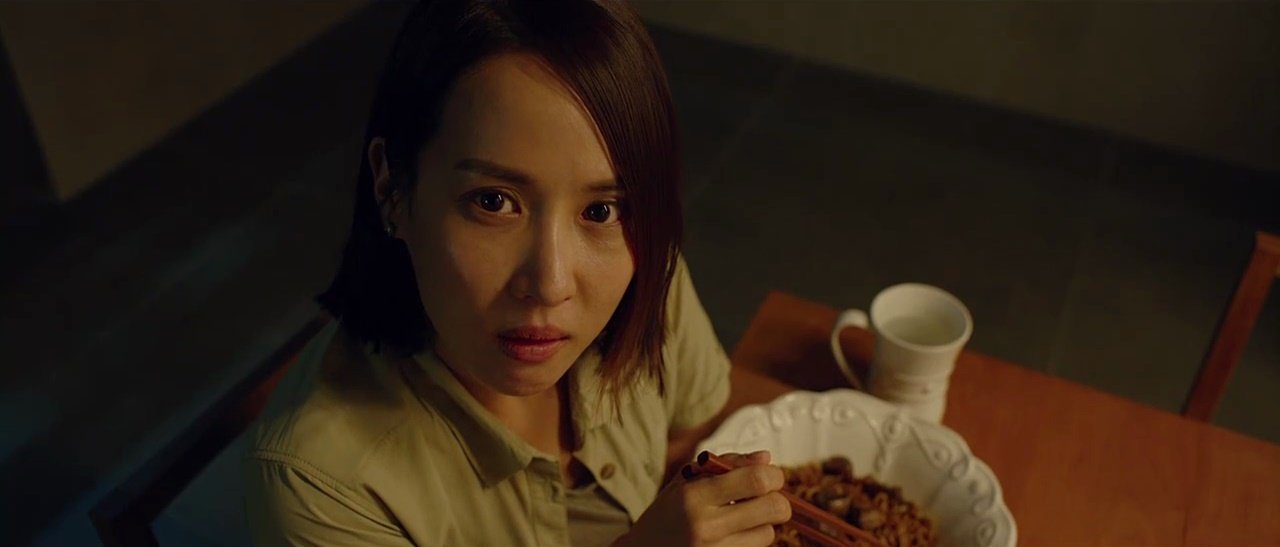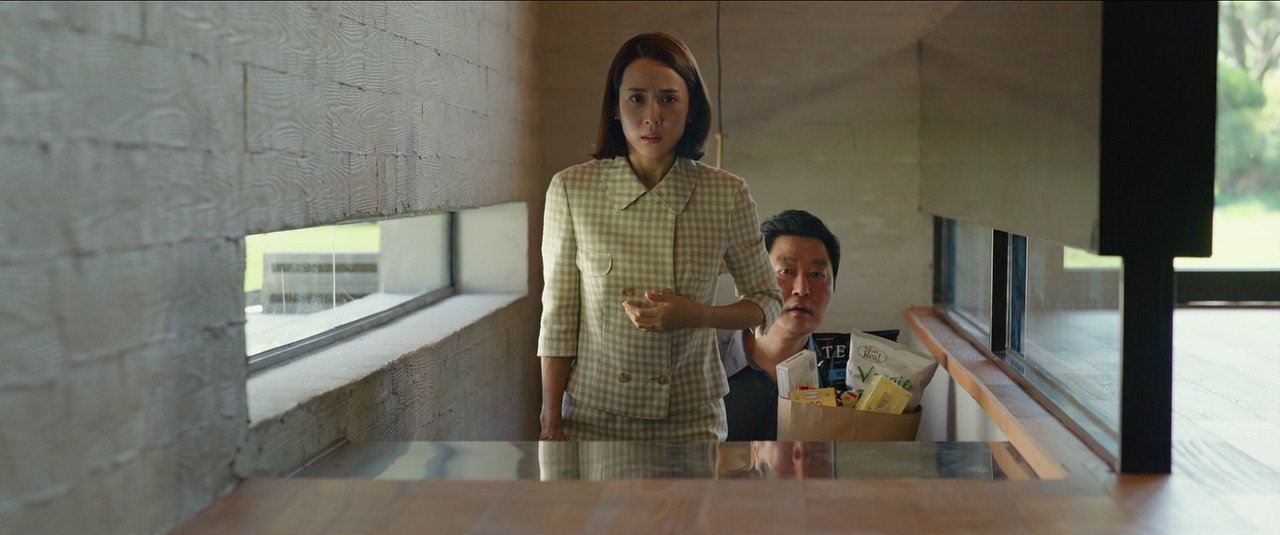The family in ‘Parasite (Gisaengchung)‘ live underground like rats in a sewer. They steal wi-fi from a nearby cafe and make Pizza boxes to survive. To combat pests they open their windows and breath in pesticide. In a way, they remind us of the family in ‘Shoplifters.’ Both families lived on the margin and barely made enough money to survive. Also, both were full of resourceful people with questionable morality. Shaw once said, Morality is a middle-class invention. The poor aren’t privileged enough to sit on a moral high horse. However, that’s where the similarity ends between both the families.
This family, however, gets lucky. A friend of their Son is going abroad. He’s in a relationship with a rich girl being tutored by him. He trusts the Son to take over the job until the time he’s abroad. The Son’s technically competent sister helps him in forging documents to pass him off as a tutor. The Parks – The family of his student live in a mansion on the Hilltop. The Parks are rich and naive. They live with a housemaid who has been living in that house even before the Parks moved in. The Son doesn’t take much time to take Mrs. Park into confidence and before they even realize, the entire family of the Underground people is employed with the Parks. The Father is the new driver, the mother is the new maid, the daughter is the art teacher and the son teaches English.
Similar to Parasite (Gisaengchung) – Cannes Interview with Bong Joon Ho
Interestingly when choosing a name for themselves, both the daughter and son drop their Korean names to go for Anglicised names like Kevin and Jessica. The wife is easy to be manipulated. The ease with which she’s convinced that her maid has TB and that her driver is a lose character is both funny and frightening. The family of the Underground is having a great time at the top of the hilltop. Their only threat being the young kid who wonders why do they all smell the same. When the Parks go for a Picnic leaving the house to the maid, it looks like they have successfully accomplished their mission. They are having a party in the mansion until a stranger arrives and everything changes.

Parasite (Gisaengchung) is directed by the man who gave us classics like Memories of Murder and Mother. Bong Joon-ho once again digs deep into the class conflict. Marxian in its approach, this film turns the exploitation tale upside down. However, it doesn’t fail to acknowledge the distance between the working class and their employers. At one point Father Park tells the driver – The Underground father how he prefers employees who “don’t cross the line.” There’s an elitist and patronizing condescension in his mannerism. However, unlike most films that pit the rich against the poor, in this case, the battle isn’t restricted to the Hilltop Parks vs Underground Parasites. There’s another variable. The ones who live in high and mighty Hilltop with open spaces but remain underground like cockroaches or rats. They exist without existing.
In a brilliant yet surreal scene, the Parks change their weekend picnic plans and decide to return back home. The Underground people are taken by surprise and hide within their house. They stay hidden unless the Parks fall asleep and then they escape.
Similar to Parasite (Gisaengchung) – Read the Bong Joon-ho Open Letter that pleads cinephiles attending Cannes to avoid giving spoilers
This is a film which doesn’t just make us sympathize with the poor. It’s a film that makes us reflect and pose questions like – Is it fine to leech on a capitalist class that comfortably sleeps in its huge mansion while the Poor have to sleep in community halls? Is it fine to cheat the resourceful to make ends meet? But more than anything, Parasite is a film that poses a moral dilemma for the working class – Is it justified to cheat on others from the same class to reach your goals?
The strength of the film lies in the fact that while it deals with questions of the philosophical question of ethics, for the most part, it remains a laugh out loud comedy. It doesn’t get preachy or static. It doesn’t feature scenes where the protagonists are sitting on a branch of misery and reflecting on existence. The characters in this film don’t whine about the inequality. They aren’t self-loathing and the director doesn’t indulge in an exercise of self-pity. These characters are aware of their place in society and are ready to use their skills to combat their lack of privilege even if that means taking a no holds barred approach of eliminating competition then so be it.

The scenes where they manipulate their owners are genuinely funny. The director mocks the artifice and facade of upper-class intelligence. In a scene, the Underground daughter – Now the art teacher Jessica, tells the mother that she’s not just an art teacher but an art psychologist. She uses the kids random painting to decode his psychology and much to her amusement, the mother who believes her son is some child prodigy is convinced.
In a way, this film also hints at how the Human Society has exploited every other natural resource. They built their Palatial empires clearing forests and trees and then when these elements attack them or hurt them we call them Parasite and pests. Bong Joon-ho already questioned our selfishness in Okja and used heightened exaggeration and visually disturbing images to showcase our brutality. It also mocked the hypocrisy of Social Justice Warriors and the common public that turns a blind eye and keeps living as nothing happened.
Recommended Read –
In ‘Parasite (Gisaengchung)‘ he takes that a step further and displays our indifference to the poor and unprivileged. No one cares even if you piss in front of their apartment or if you die inhaling pesticides. But if you cheat the rich you have to look for gutters and live like a Ghost. Perhaps that’s the only way to escape the burden of the distorted upper class laws.
Bong Joon-ho – who has been known for thrillers and elements of sci-fi in his films doesn’t completely depart from his style. The film remains a suspense thriller as new dimensions keep getting uncovered. We are all left shocked and amazed at every turn and how a completely new gateway of questions open up with every twist.
As the Father from Underground is sleeping in a community hall, their home being flooded with shit and water; he tells his same scented son from Underground that there’s no point of planning anything in life because of none of the people sleeping there ever planned to sleep here? And that’s perhaps the most important take from Parasite (Gisaengchung). No matter how much you plan in the end life has other plans. This one is an Instant Classic.


